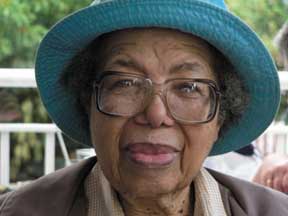
Read an excerpt of Anita Cornwell's groundbreaking book,
Black Lesbian in White America
| readings/appearances | books | poetry | about | audio/ site map | submit | Tea Leaves: mothers & daughters | links/contact | readings/appearances |
click here to read Anita's work on amusejanetmason.com
Click
here to read commentary on Anita Cornwell
Read an excerpt of Anita Cornwell's groundbreaking book,
Black Lesbian in White America
Anita Cornwell was in her forties by the time second wave feminism arrived in the mid-1960s. She soon became one of the few black lesbians in the United States who were living out, speaking out, and writing out. Her pioneering book Black Lesbian in White America published in 1983 by Naiad Press.
Angela
Davis --
Scholar and Black Power Revolutionary
interviewed by Anita Cornwell--
|
--reprinted from the Thomas Merton Center (http://www.thomasmertoncenter.org/merton_award_2006.htm)
|
Looking
Back: click
here to read Angela Davis, part I
ii When Angela Davis learned of the charges lodged against her, he did what I suppose any red-blooded African-American would have done, she took to the hills, thereby landing on the FBI's Ten Most Wanted list. In October, 1970, Davis was apprehended in New York City and placed in the Women's House of Detention, the very Greenwich Village Jail that had often frightened her as she made her way to and from the Elisabeth Irwin High School which stood only a few blocks away. The two months that Davis spent in the Women's House of Detention, where "Women were heavily drugged or treated like children," marked the beginning of the final phase of her transformation into a true revolutionary. As Davis herself said in the book she wrote, edited, and assembled with the help of friends and associates while in prison, "Within the contained, coercive universe of the prison, the captive is confronted with the realities of racism, not simply as individual acts dictated by attitudinal bias; rather he is compelled to come to grips with racism as an instituional phenomenon collectively experienced by the victims." "The disproportionate representation of the Black and Brown communities, the manifest racism of parole boards, the intense brutality inherent in the relationship between prison guards and Black and Brown inmates -- all this and more cause the prisoner to be confronted daily, hourly, with the concentrated systematic existence of racism." [If They Come in the Morning, (London: Orbach & Chambers, 1971, pp. 35-36.] In addition to that pervasive state of racism, the Black female prisoners are also subjected to the virulent sexism that is embedded in this same system. As Davis wrote in her Autobiography, "...whether we are sixteen or seventy, we are girls...Any pastime that was intellectually demanding seemed suspect. The jailers in Marin County were extremely hostile to allowing a chess game...One other jail "outlet" was overwhelmingly sexist. It was the... presence of the washing machine, clothes dryer and ironing paraphernalia which, discounting the metal tables and backless stools, were the sole furnishings in the day room...The men's linens and jail clothes were sent elsewhere for laundering; the women were expected to do their own. If they did not volunteer to do the washing and ironing, a work schedule was imposed...when no one volunteered, Back women were ordered to do it." [Randome House, 1974, p. 309.] Also in her Autobiography, Davis wrote some revealing insights regarding her years at Elisabeth Irwin and Brandeis: "Elisabeth Irwin had spun a cocoon around itself. During those two years...I never quite overcame the sense of being out of place, of being an outsider who had penetrated that cocoon by accident..." "...the full scholarship Brandeis had bestowed upon me was apparently a guilt-motivated attempt to increase their Black freshman populaton of two. We three were all female...I felt alientated, angry, alone....it didn't help the situation that I had gotten very much involved in the writings of the so-called Existentialists...I retreated into myself and rejected practically everything outside. Only in the artificial surroundings of an isolated, virtually all-white college compus could I have allowed myself to cultivate this nihilistic attitude..."
Return to amusejanetmason.com next month to read the next installment Click here to read commentary on Anita Cornwell
|